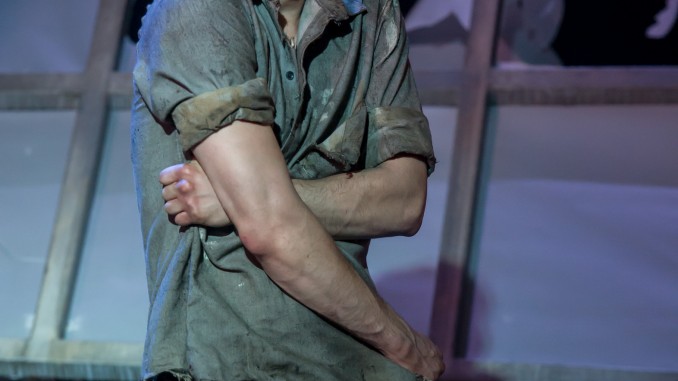
Boys own Apocalypse [by James Wenley]
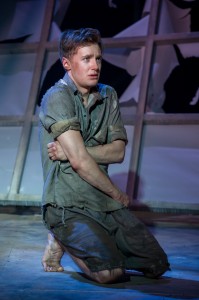
Auckland Theatre Company’s stage production makes a nod to the usual medium the Lord of the Flies story is inherited: the secondary school classroom. A bookend, invented by Director Colin McColl and his cast, sets the leads as contemporary high-school students encountering William Golding’s 1954 novel. Project artwork of various pig heads, beasts and plane crashes dot the classroom wall. It doesn’t take long for the unsupervised boys to engage in stimulated sexual violence. Once Peter Daube’s teacher arrives, its back to the desks, and one-by-one the boys produce the symbology and motifs of the text that English teachers are so fond of: Piggy’s glasses, the conch (perhaps the most important, the teacher ruminates), and of course, a dead pig’s head.
It seems to be a laboured attempt too to connect with the 2000+ high-school students who will see the play during its run, and a scene no doubt, that has played out many times before in classrooms across the globe. I remember the lists of symbols and themes of my Year 12 English and those class discussions. I remember Golding’s vision holding a dark fascination, something subversively appealing when considering what would happen when society’s veneer is up-ended. As countless NCEA essays have already questioned, is savagery our natural state? It’s one of those ultimate ‘what-ifs’: when society crumbles, will you prove to be a Ralph, a Piggy, a Simon, a Roger, or a Jack?
We’re transitioned onto the island when the classroom collapses; Eden Mulholland’s distorted score and projected video kicks into high gear and jolts the audience out of any sense of complacency. The classroom shell is now visualized as a massive jungle gym, and Tracey Collin’s ultra-raked feature wall – which the actors dangerously clamber up and down, perch precariously on top of, and burst through – is a star player of the production. So too are the crew working backstage with a substantial re-set each night.
We first meet Ralph (Leon Wadham), our presumptive hero, and Piggy (Zane Fleming), our presumptive scape-goat and discarded moral compass. A plane-crash has bought them, and an unknown number of schoolboy survivors, en route to escape the dangers of a threatened war. Their encounter mixes fears of “the bomb”, a potential apocalypse where the adults haven’t survived, with schoolboy posturing, an aborted hand-stand competition, and practical matters: Piggy thinks they ought to have a meeting. A blow on a found conch brings forward refugees from a school choir (students from Kings School bolstering the numbers), led by the entitled Jack (Jordan Mooney). Ralph finds himself elected leader, and the assorted castaways attempt to negotiate the new rule of schoolboy law – “We ought to have some system” – that soon descends into vicious tribalism.
Playwright Nigel Williams’ adaptation was first prepared for a 1992 production at Kings’ College Junior School, Wimbledon, and later performed by the Royal Shakespeare Company in 1995. His play takes a workmanlike, if slight approach to the staged narrative. The play speeds to its savagery in less than 90 minutes – allowing for energy and thrills, but not for a more nuanced and gradual descent into the characters’ inner beasts, nor a sufficient build-up of unbearable tension. It’s a shallower play as result. Dialogue is often perfunctory and psychologically flimsy, at odds with the imaginative expanse of Williams’ source. Nestled in the program is a reference to Williams’ version of the play being used as “the basis for this ATC Production”. I understand that text from Golding’s novel has been pooled back into the play, accounting for the moments where we do catch some of the story’s latent power, such as Simon’s (Anton Tennet) disturbing communion with the beast.
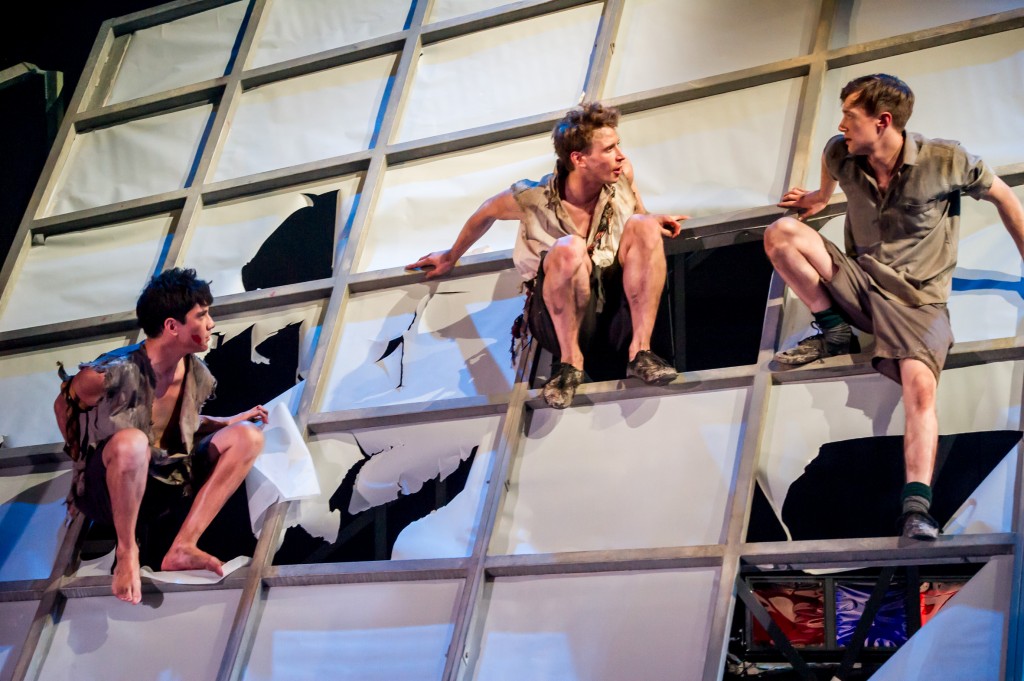
The lead male cast are physically fearless and ferocious, giving off the believable energy of characters a number of years younger than themselves. As written, Ralph is a less interesting character than his contemporaries, but Wadham makes good material out of the burden of leadership. Zane Fleming makes a fascinating Piggy, finding a firm emotional centre out of the unshakeable knowledge that he is right, but also gives us a strong note of patheticness in that he knows he won’t be listened to before he has even tried. You understand why Piggy is the immediate target, Fleming carrying an emotional scar that has travelled with the character long before arriving on the island. Nathan Mudge does a lot with a little as Roger, Chris Bryan and Caleb Wells are entertaining cocksure sidekicks Bill and Maurice, and the younger (double cast) leads more than hold their own.
This production of Lord of the Flies, however, belongs to Jordan Mooney’s Jack Merridew. A veteran of ATC’s youth wing, and already having made critical impressions in Anne Boleyn and The Heretic this year, they were merely warm-ups for Mooney’s assault into the heart of darkness. Layering a snide comic energy and a born-to-rule British class system mentality that masks clearly deep-seated inner vulnerabilities, Mooney’s Jack is a compelling study of a tyrant. Villains often outclass their heroes, and Mooney’s scene chewing (or rather scene slaughtering) coupled with the critical deficiency of the scripting, means that the play is entirely weighted towards Jack. Ralph’s moral conundrum gets lost at sea, and Piggy’s countering plea for decency barely gets a look in.
Design elements are superb, from theatre newcomer Kiri Rainey’s increasingly weathered costuming to Philip Dexter’s gloomy lighting. The design, score, and gung-ho performances work overtime to patch over the cracks in the script, but no amount of spectacle can disguise the fact that this is an theatrically poor adaptation, McColl’s interpolations unable to redeem its faults. There’s another problem too: moments in the novel that imaginatively enlarge in the mind’s eye of the reader remain stage-bound: the lord of the flies itself, or the first act of point-of-no-return violence.
The story of Lord of the Flies remains a potent “what if”, and a frame in which to consider the world. What lessons does Flies hold, for example, in trying to make sense of the senseless of the Syria crisis? Auckland Theatre Company’s production delivers the visceral thrills, but doesn’t reach the black heart of the story. Like the students empty parade of the novel’s symbols at the start of the play, so too is the play’s symbolic power ultimately shown up to be empty. This is not a Lord of the Flies as allegorical horror, but a Lord of the Flies as escapist adventure.
William Golding’s Lord of the Flies is presented by Auckland Theatre Company and plays at The Maidment until 28th September. Details see ATC.

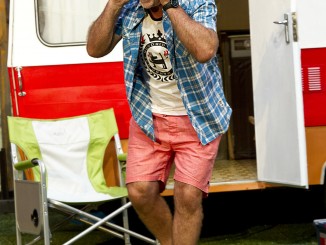
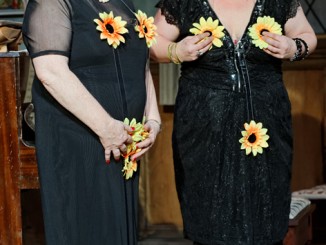

Leave a Reply